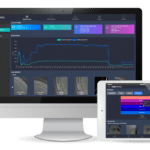In response to the international glass container industry’s growing acceptance and adoption of ‘smart’ manufacturing practises, IRIS Inspection machines has expanded its NEO range of smart inspection solutions. According to Jean-Luc Logel, this latest generation defect detection technology propels the company’s brand into the next era of smart machines.

Created in close consultation with key customers, the latest NEO technology goes beyond the conventional boundaries associated with specialist inspection machines, delivering a more comprehensive offering to face the challenges presented by the smart factory. The NEO Series heralds the arrival of a new era, where glass inspection is not only sustained by machines but also by accurate data and the ability to comprehend, compute and connect it.
This is the result of many years of dedicated research and development to realise even better productivity results, while also reducing dependence on human intervention. The IRIS team has created an innovative defect approach that relates to defect identification, as well as the creation of statistics by defect type. Local trend analyses are produced on the machine, with information presented in a user-friendly format.

Intelligent defect recognition
NEO Intelligence is based on an innovative defect approach that relates to intelligent defect recognition and sits at the core of Evolution non-contact glass container inspection equipment. The latest generation Evolution NEO series marks an important break with other glass inspection machines, bringing the concept of the smart factory even closer. NEO eXperience is the NEO dashboard, designed to assist glassmakers to understand the causes of defects, to simplify the adjustment of settings and to reduce false rejection rates.
While operators need accurate data and images that show a defect, managers require a relevant overview for decision-making purposes. Consequently, the inspection data created is available not only on the machine itself but remotely on such devices as laptops and smartphones, for plant managers to monitor performance and initiate changes where necessary. Featuring advanced statistical tools, the equipment allows operators to follow rejection rates per defect type and immediately to bring their attention to the most significant information analysed by the machine.
Repeatability of settings is an important advantage. Traditionally, every time a production change is initiated, it has been necessary for the operator to adjust all parameters for the new article, set the inspection zones etc. R&D engineers at IRIS have been working on this issue to reduce the time required for adjustments. With Evolution NEO, a library of settings is available for faster, precise and repeatable adjustments.
In addition, defect images are available to hot end personnel, providing the ability to share critical defect characteristics and defect images in real-time, alerting IS machine operators to instances of critical defect detection. Importantly, the technology is compatible with all standards of communication. Furthermore, the alerts received from the equipment can also be consulted on the dashboard.
Industry 4.0 focus
Industry 4.0 is no longer something for the future. It is already a part of everyday business and the IRIS R&D Department is constantly investigating the latest advances in technology to keep its machines at the forefront of innovation. However, the Industry 4.0 revolution is not only about technology and digitalisation. It also concerns people, skills and their relationship. It is another way to work, from product-centric to customer centric.
With respect to Industry 4.0 and other potential technological advances, IRIS Inspection machines continues to work closely with its customers, understanding their daily tasks, identifying which functions are unnecessarily time-consuming and helping them to save time and money.
Open format
The smart factory is only attractive if it is cross-functional, connecting IT and OT, from business processes to smart machines. However, proprietary solutions are constantly emerging. Under these proprietary models, containing Artificial Intelligence or IIOT, data collected and analysed may need proprietary software to be read reliably. Unlike an open format, the description of the format may be confidential or unpublished and can be changed by the company at any time. Proprietary software usually reads and saves data in its own proprietary format. There can be no assurances for the glassmaker that the company’s data will be compatible with the rest of its systems, nor will it be readable in the future.
NEO intelligence use an open format only. The structure is set out in agreed standards, overseen and published by an expert body. A file in an open format enjoys the guarantee that it can be read correctly by a range of different software programmes or used to pass information between them. Data created by NEO Intelligence, including defect category, characteristics or images, is fully compatible with the information system. The NEO range is in line with this global compatibility approach.
Widespread acceptance
The NEO series of inspection solutions has already received widespread glass industry acceptance, generating multiple orders, in particular from European and Latin American glass packaging producers. Already, 510 machines are running NEO software throughout the world, with excellent customer feedback generated for the innovative defect approach adopted.

